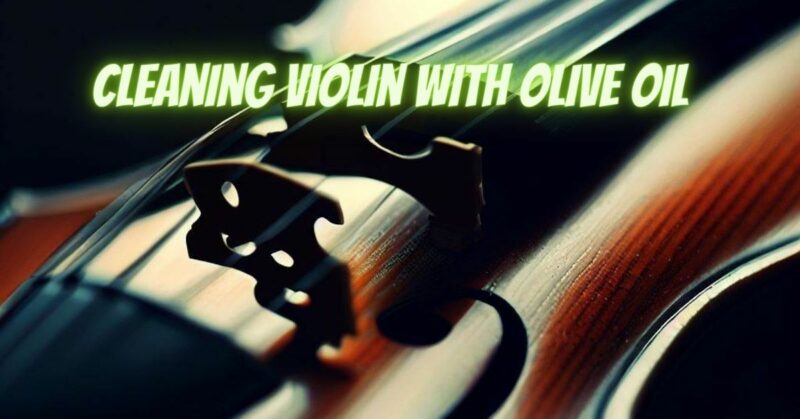Maintaining a clean and well-preserved violin is crucial for its longevity and performance. While there are various methods to clean your violin, some may wonder if using olive oil is a safe and effective option. In this article, we will explore the topic of cleaning a violin with olive oil, discussing the potential benefits, risks, and alternative methods to keep your instrument in pristine condition.
- Benefits of Olive Oil:
- Restoring Luster: Olive oil can help restore the luster of a violin’s varnish, making it appear refreshed and vibrant.
- Moisturizing Dry Wood: In cases where the wood on your violin appears dry or lacks shine, applying a small amount of olive oil can provide moisture and enhance its appearance.
- Risks and Considerations:
- Potential Damage: While olive oil has moisturizing properties, it can seep into the wood, potentially damaging the instrument’s delicate structure. Excessive or improper application can lead to warping, swelling, or even cracks.
- Residue Buildup: Olive oil can leave a sticky residue on the violin’s surface, attracting dust and dirt over time. This residue can be difficult to remove and may require professional cleaning.
- Safe Alternatives for Cleaning:
- Dry Cloth: For routine cleaning and dust removal, a soft, lint-free cloth is usually sufficient. Gently wipe the instrument’s surface and strings to remove dust and debris.
- Commercial Violin Cleaning Products: Many specialized violin cleaning products are available on the market. These products are formulated specifically for delicate instruments, ensuring safe and effective cleaning without risking damage.
- Professional Cleaning: If your violin requires deep cleaning or maintenance beyond routine care, it is best to consult a professional violin maker or luthier. They have the expertise and tools to clean your instrument safely and thoroughly.
- Routine Maintenance Tips:
- Avoid Excessive Moisture: Exposing your violin to excessive moisture can lead to swelling, warping, or damage to the varnish. Keep your instrument in a controlled environment with moderate humidity levels.
- Store Properly: Use a high-quality case with a humidifier to protect your violin when not in use. This helps maintain stable humidity levels and prevents excessive drying or moisture absorption.
- Handle with Clean Hands: Always ensure your hands are clean and free from oils, lotions, or sweat before handling your violin. These substances can transfer onto the instrument’s surface, potentially affecting its varnish or wood.
Conclusion:
While olive oil may offer certain benefits for restoring luster and moisturizing dry wood, it is not recommended as a primary method for cleaning your violin. The potential risks of damage and residue buildup outweigh the benefits. Instead, opt for safe alternatives such as dry cloth cleaning, specialized violin cleaning products, or seeking professional assistance when necessary. By following proper maintenance practices and handling your violin with care, you can keep your instrument in optimal condition and enjoy its beautiful sound for years to come.


